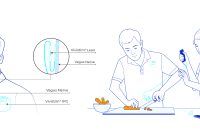SEISMIC-HF II follows promising results from the peer-reviewed SEISMIC-HF I study, demonstrating accuracy of the Company’s non-invasive cardiac filling pressure algorithm comparable to that of FDA-approved implantable sensors
CHICAGO – May 28, 2025 – Cardiosense, a medical AI company transforming cardiovascular disease management, today announced the launch of SEISMIC-HF II, a nationwide study to validate the company’s machine learning algorithm for assessing intracardiac filling pressure, an early indicator of acute heart failure decompensation. This milestone marks a critical step forward in advancing Cardiosense’s mission to enable access to smarter, personalized cardiac care for all heart failure patients.
The study follows the success of the 2024 SEISMIC-HF I study, which demonstrated the ability of the machine learning algorithm–an FDA Breakthrough Device–to non-invasively estimate pulmonary capillary wedge pressure (PCWP) in patients with heart failure with reduced ejection fraction (HFrEF). The findings were presented as late-breaking science at the American Heart Association’s (AHA) 2024 Scientific Sessions. The algorithm achieved “accuracy similar to existing FDA-approved implantable pressure sensors,” according to AHA scientific reviewers. Results from the SEISMIC-HF II study will be used to support regulatory filings.
Heart failure affects nearly 6.7 million adults in the U.S., resulting in over $30 billion in annual healthcare costs and nearly 50% of patients being readmitted within six months. The current standard of care, focused on weight and symptom monitoring, has proven largely ineffective at providing actionable insights to guide proactive management of cardiovascular disease.
“Although there are clear physiological patterns that precede acute heart failure events, identifying them has traditionally required invasive methods only available in acute care settings,” Amit Gupta, CEO and co-founder of Cardiosense, said. “SEISMIC-HF II represents a critical step in validating our non-invasive solution to identify early warning signs, which has the potential to measurably improve the lives of heart failure patients at scale.”
The prospective, multi-center, blinded study will collect data from patients undergoing a right heart catheterization (RHC) across multiple geographically diverse sites. Cardiosense’s non-invasive PCWP estimate will be compared to the RHC measurements to validate the performance of the AI algorithm.
“The results from the SEISMIC-HF I study hold tremendous potential to greatly expand patient access to hemodynamic-guided remote care management through a non-invasive solution,” said Allman Rollins, M.D. of Inova Fairfax Medical Campus. “I was excited to participate in that study and am thrilled Inova was the first site to enroll patients in SEISMIC-HF II.”
SEISMIC-HF II findings will help substantiate the technical accuracy of the first AI algorithm behind Cardiosense’s heart failure management solutions, as Cardiosense aims to evolve the current standard of care to support more proactive, personalized management while potentially reducing hospital readmissions and healthcare costs.
For the latest news and information, follow Cardiosense on LinkedIn, or visit: www.cardiosense.com.
About Cardiosense
Cardiosense is a leading medical AI company redefining how we detect, monitor and manage cardiac disease. Built on over a decade of clinical and scientific research, the company is developing novel wearable sensors and machine learning algorithms that translate raw physiological signals into clinically actionable parameters to detect early signs of cardiac disease, guide personalized therapy and improve patient outcomes.






